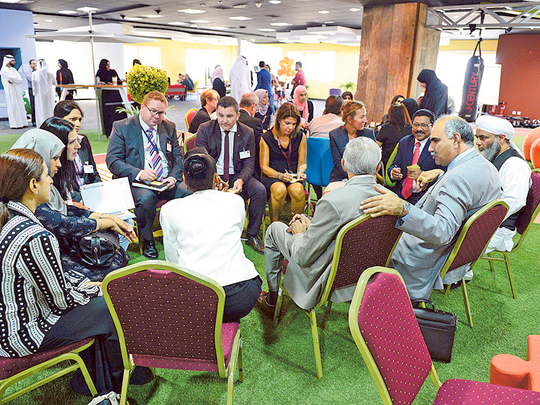
Dubai: The Dubai education sector regulator, Knowledge and Human Development Authority (KHDA), on Monday said schools will work on moving towards positive education by implementing 10 key character traits.
The announcement came after a gathering of over 100 school principals at the KHDA office to learn more about positive education and to focus on well-being, happiness, and holistic development of Dubai students.
Private schools following different curricula in Dubai are collaborating for good by embracing positive education values and sharing knowledge through the project.
The 10 traits for positive education are creativity, curiosity, courage, integrity, resilience, empathy, fairness and tolerance, awe, gratitude and purpose.
“Every school feels a sense of shared responsibility towards meeting the national agenda goals,” said Dr Abdullah Al Karam, chairman and director-general of KHDA.
The KHDA also announced that starting this year, school inspection results will feature insights on progress made by individual schools in achieving national agenda goals. “We have seen some good examples of schools who have used international assessment data by sharing it with students and parents and this has helped in our journey towards achieving UAE National Agenda goals,” said Dr Rabaa Al Sumaiti, director of International Assessments at KHDA.
The inspections also include an emphasis on the UAE National Agenda Parameter which measures and monitors schools’ progress towards achieving the targets. All schools in Dubai are required to participate in international and external benchmarking assessments on an annual basis other than TIMSS and PISA (international assessment tests). The objectives underpinning the UAE National Agenda, which was launched in 2014 by His Highness Shaikh Mohammad Bin Rashid Al Maktoum, Vice-President and Prime Minister of the UAE and Ruler of Dubai, provide schools with concrete targets against which to measure the progress they are making towards achieving the aspirations of the UAE Vision 2021.
To assist schools in meeting their assigned targets, KHDA encourages collaboration between school principals. Last year, principals worked together as part of the lighthouse project to understand the success of countries who have improved their international assessment results. Some of the countries selected for the project included Turkey, Portugal, Italy, Chile, Australia and Iran, among others.
What is the UAE National Agenda?
Shaikh Mohammad launched a seven-year UAE National Agenda leading to the UAE Vision 2021 which also coincides with the UAE’s 50th National Day.
The UAE National Agenda, which was developed by over 300 officials from 90 federal and local government entities, includes a set of national indicators in the sectors of education, health care, economy, police and security, housing, infrastructure and government services.
These indicators are long-term, measure performance outcomes in each of the national priorities, and generally compare the UAE against global benchmarks. The national indicators are periodically monitored by the government leadership to ensure their targets are achieved by 2021.











